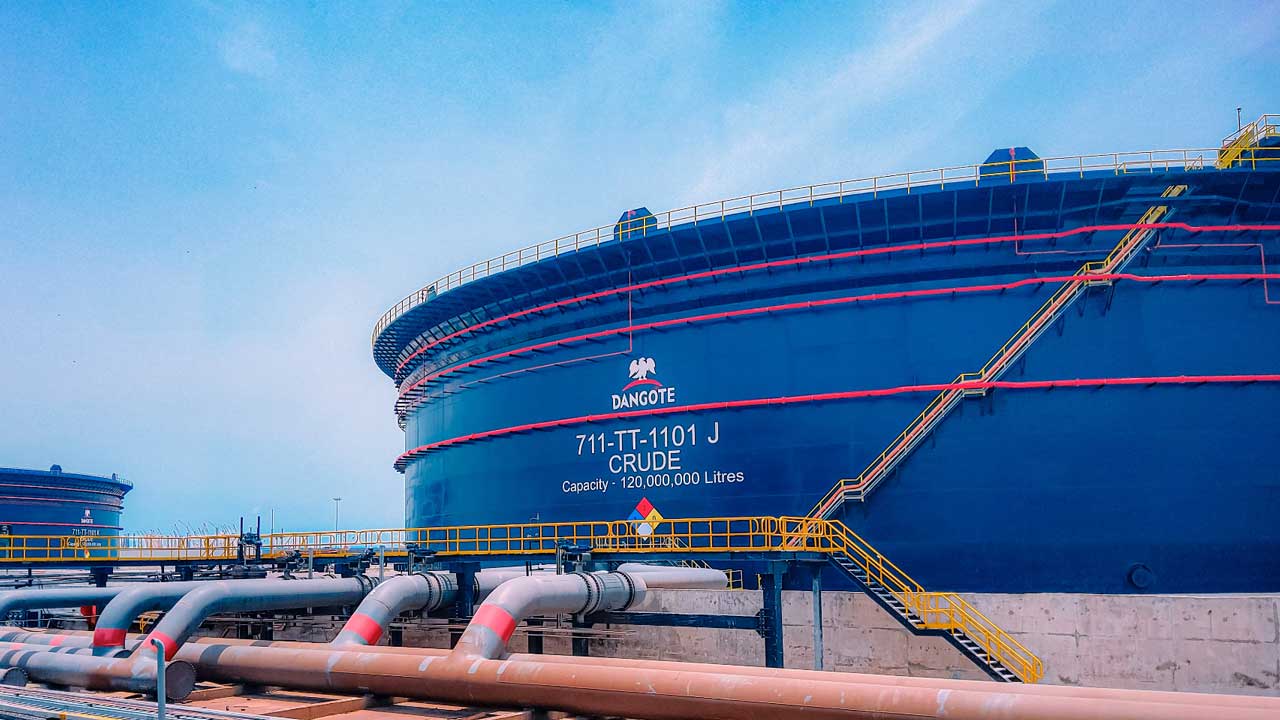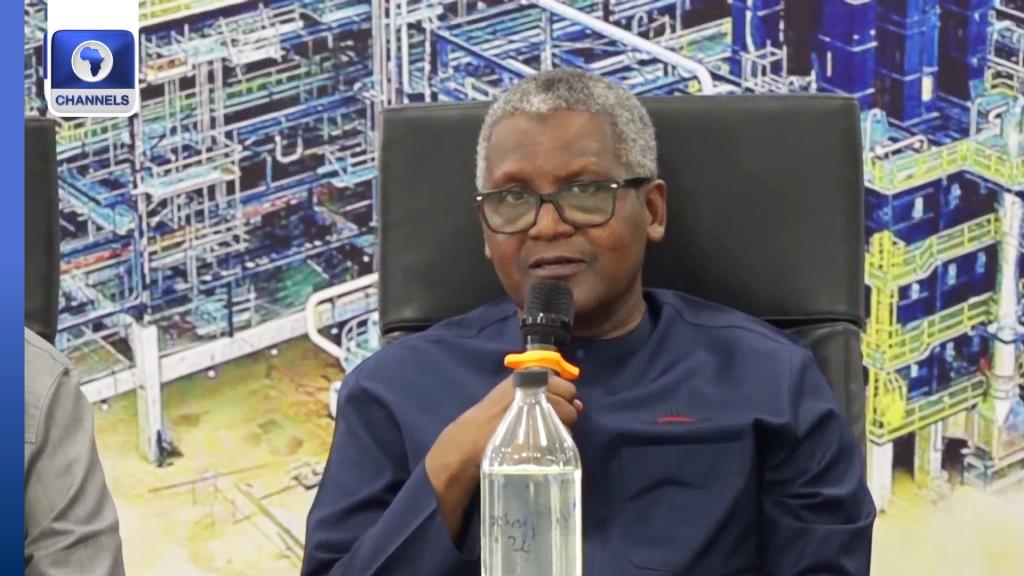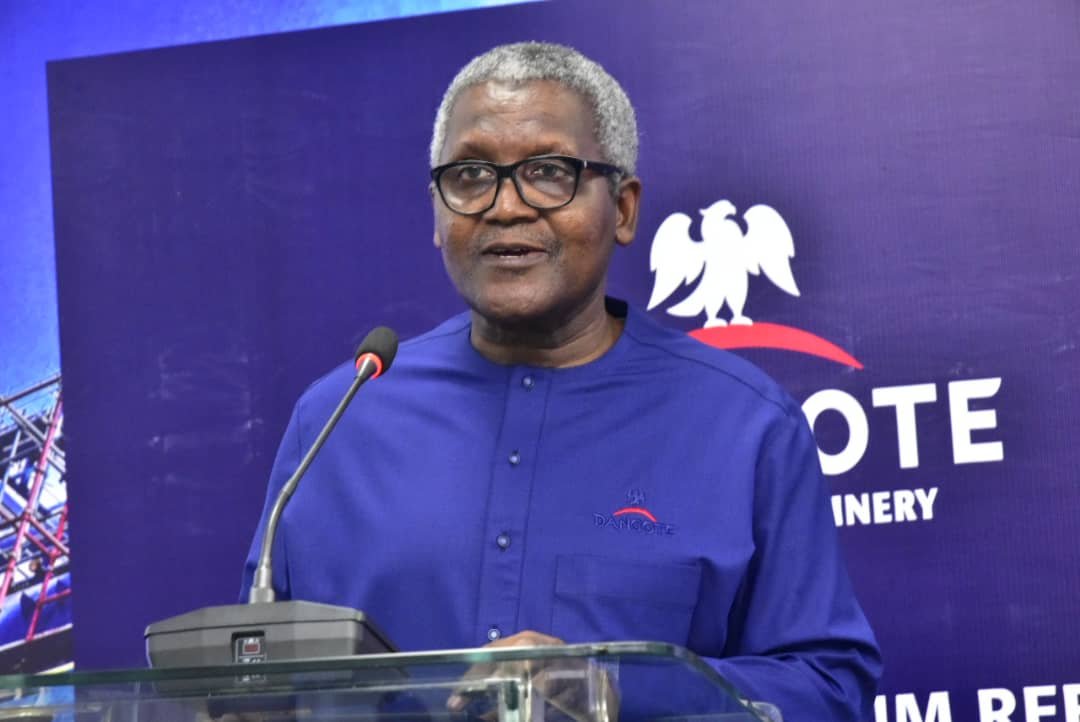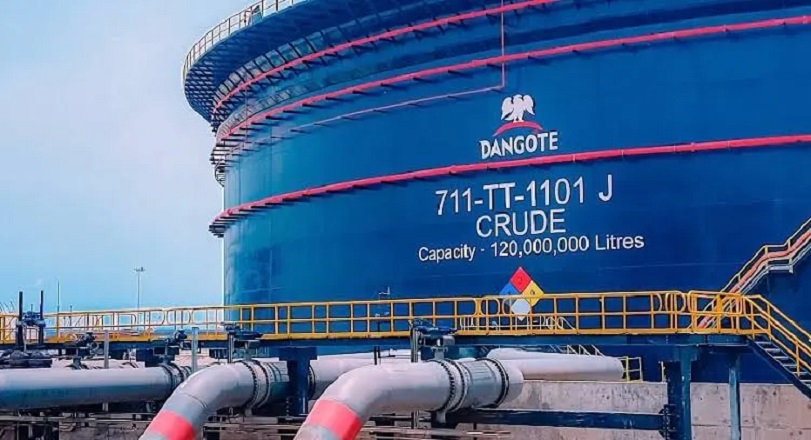Feature/OPED
Dangote Refinery, NNPC and Lingering Issue of Crude Supply to Local Refineries

By Jonas Kayode-Jacobs
The ceremonial inauguration of the Dangote Refinery has added a new dimension to the conversations regarding the need to rebound the hitherto declining situation of the Nigerian petroleum industry and the long-standing desire to locally refine and provide all essential commodities in the oil and gas value change.
There is no doubting the fact that the refinery project, referred to as the biggest in the world, has marked a new chapter in the evolution of Nigeria’s energy sector, signally a historical turning point and a raised expectation for expanded domestic refining capacity and decreased dependency on petroleum products importation.
It was seen as a beacon of progress and a testament to the entrepreneurial spirit driving Nigeria’s economic growth and driven mainly by private sector initiatives, of course, with an enabling environment and support provided by the government. Commencing in 2013, the refinery’s advanced technology, efficient processes, and commitment to international quality standards have garnered global recognition, positioning it as a flagship project in Africa’s energy landscape.
However, interesting questions have been raised by industry experts regarding the Nigerian National Petroleum Corporation’s (NNPC) decision to provide Dangote Refinery with exclusive access to 300,000 barrels per day for a refinery that, according to some experts, has not been technically completed.
This concern arises from the seeming neglect and abandonment of other existing indigenous refineries. Many of these refineries that have been completed and producing skeletally have not received crude supplies from the NNPC to boost their operations to maximum installed capacity.
In a recent statement, the Crude Oil Refineries Owner’s Association of Nigeria (CORAN), while applauding the decision of the NNPC to supply daily 300’000 barrels of Crude Oil to Dangote Refinery, as made known by the Group Chief Executive Officer of the NNPC, Mele Kyari, the association raised concerns to the effect that NNPC seem to have neglected its members.
Understandably so, the decision of the NNPC to allot 300,000 barrels per day of crude oil to the Dangote Refinery is meant to support the refinery’s start-up activities and ensure its successful operation. However, some industry watchers have said that similar special treatment should also be extended to other refinery owners. Still, instead, it has put other refinery owners in a precarious situation and at the mercy of Dangote Refinery, which will become a monopoly on the first day.
It is necessary to highlight that many refinery owners now face a more uncertain future as they struggle to deal with restricted or no access to crude oil supplies while having made considerable investments in their refining plants.
While the NNPC deserves praise for its decision, it must make sure its plan addresses the distribution of crude to other players in the market, as the majority of independent and privately owned refineries have been severely hampered by a lack of crude since they were founded.
The issue at hand is one of fairness and equitable distribution. There is no gain in saying that the existing refineries require a steady crude oil supply to operate optimally. By disproportionately allocating crude to one refinery, the NNPC risks stifling the growth and viability of these other existing facilities, which also contribute to the nation’s refining capacity and provide employment opportunities.
In every sense, there is an urgent need to provide a level playing field for all the operators and a transparent and inclusive approach to crude oil allocation. A fair and level playing field would not only foster healthy competition but also ensure that Nigeria maximizes its refining potential and benefits from a diverse range of players in the market.
In any case, the near redundant refineries only require less than 10% of the crude supply of what the Dangote refinery has been promised (300’000 pbd). Therefore, the NNPC must come to the aid of these other private refinery owners whose desire it is to contribute to refining and improving the standard of living of the nation.
The NNPC can do so by ensuring that there is equal and equitable access to crude and ensuring that there is a level playing field for all businesses in that sector. Independent Oil refineries in Nigeria, such as Walter Smith refinery, OPACrefinery, Niger Delta Petroleum refinery, and Edo Refinery, have faced numerous difficulties that have tried their resilience and hampered their ability to expand. Among these challenges, the top is the serious problem of the starving of crude oil engineered by the NNPC, which has put a shadow over their activities, impeding their ability to contribute to the nation’s refining capacity properly.
Despite the phenomenal ceremonial inauguration of the Dangote Refinery, it cannot be said to be a ‘Uhuru’ yet as, according to industry experts, the refinery may need up to another 12 months to be at full capacity. According to the report of the Nigerian Midstream and Downstream Petroleum Regulation Authority (NMDPRA), the Technical Acceptance Test (TAT) that is mandatory for any refinery to run must still be passed by the Dangote Refinery. Since this procedure takes a while, technically, the Dangote Refinery’s full operation could start in about a year. This underscores the urgent need for the NNPC and the government to put an interest in the operations of the existing and ready refineries.
While the Dangote Refinery undoubtedly holds immense promise for Nigeria’s energy independence, the aspirations of other refinery owners must not be disregarded. A collaborative approach that encourages synergy and coexistence among all refineries will ultimately benefit the nation. The NNPC’s commitment to allowing all participants to engage in the market actively will help increase the supply of critical commodities and lessen persistent scarcity in the market.
Kayode-Jacobs, a petroleum industry analyst, writes from Abuja
Feature/OPED
From Aid to Trade: Turning China’s Investment into Export Power

By Rachel Irvine
Africa may not boast the largest economies or deepest pockets, but it has what many regions lack: energy, youth, abundance, and innovation. While the rest of the world gets older and runs out of steam, Africa’s cities are expanding, consumer demand is rising, and resources remain plentiful.
What this means is that in the next 25 years, over half of global population growth will emanate from Africa, shifting the currents of investment, infrastructure, and trade.
Deep historic and cultural links are keeping the West engaged in Africa, but changing geopolitical dynamics are changing how its economic and strategic importance is viewed.
First mover advantage
Recognising its potential as a new frontier for global economic growth early on, China was Africa’s first meaningful investor in the 21st century. Over the past two decades, the Asian colossus has shifted its early focus on extractive industries to investing in renewable energy, railways, ports, manufacturing, digital networks, and healthcare. This commitment has helped lay much of the physical and digital backbone that Africa so desperately needs to grow.
Across the continent, projects backed by Chinese investment have strengthened critical systems and enabled new markets. The National ICT Backbone in Tanzania has expanded broadband access, made e-health and e-learning possible, and strengthened e-government services. In Sierra Leone, the China-Sierra Leone Friendship Hospital, built over 7,700m², continues to enhance healthcare delivery and played a vital role during the Ebola outbreak. The proposed $1.4 billion upgrade of the Tanzania-Zambia Railway furthermore promises to revitalise a key regional trade corridor for copper exports and improve transport efficiency in the region.
Such stories about local projects may not dominate headlines abroad, but they stimulate markets, build skills, and engender the conditions for African businesses and consumers to thrive.
A partnership evolving with the times
China’s approach has evolved to match Africa’s economic trajectory. The early years were defined by sovereign-backed megaprojects. Today, China invests in targeted, more manageable and commercially viable investments that encourage local participation and private-sector delivery while providing a clearer return on investment. This “small and beautiful” phase of its Belt and Road Initiative is well suited to Africa’s priorities: building industrial capacity, expanding renewable energy, and accelerating digital transformation.
The automotive sector offers a clear example. In South Africa, nearly half of the 14 Chinese car brands that are now active in the country, entered the market in the past year. BYD, one of China’s largest electric vehicle manufacturers, plans to triple its dealership network by 2026 and expand its range of electric and hybrid models. Other manufacturers, including Chery and Great Wall Motors, are gaining ground by offering technology-rich, competitively priced vehicles tailored for African consumers. These moves are about more than sales: they are building supply chains, creating jobs, and positioning South Africa as a hub for electric vehicle adoption and assembly.
Shifts in global trade are reinforcing these opportunities. As Western protectionism grows, including through US tariff regimes, China is expanding zero-tariff access for African goods and strengthening its role as a reliable trade partner. For African economies, this opens new markets and buffers against volatility in traditional export destinations.
Why engagement matters
For African governments, China’s role is pragmatic and strategic because it speeds up infrastructure delivery, broadens industrial bases, and opens new trade corridors. For businesses, aligning with this investment momentum can mean first-mover advantage in high-growth markets, improved access to logistics and industrial hubs tied into global supply chains, and opportunities to co-develop products and services for a rapidly expanding consumer base.
However, simply being present in the right markets is not enough. Success depends on positioning: showing a clear understanding of local priorities, demonstrating long-term commitment, and framing participation as part of Africa’s wider development story, which is why those that approach this relationship with clarity and purpose will gain both economic and reputational value.
This requires communicating the partnership in a way that resonates with audiences in both Africa and China – replacing outdated narratives of dependency with a focus on mutual benefit, shared priorities, and tangible results. Because perceptions can shift quickly and decisively, telling that story effectively is as critical as the investment itself.
Trade, not charity
Africa must be a partner, not a passive recipient of Chinese largesse by making African Continental Free Trade Area rules bite at the border, cutting clearance times, lifting product standards, and expanding export finance so manufacturers are able to deliver volumes. Manage debt in the open, and drop the tired “China asset grab” narrative, because outright takeovers are rare. The real work is negotiating clear, enforceable contracts that secure skills transfer and grow local capacity. The aim isn’t investment for show, but investment that builds competitive industries and export muscle. That’s how Chinese capital turns into jobs and exports.
Looking ahead
Africa’s annual infrastructure financing gap still exceeds $100 billion. No single partner can close it, but China’s willingness, scale, delivery capability, and track record make it an indispensable player in meeting that challenge.
For those who read the signs, the opportunities are boundless. The next decade will define the course of Africa’s growth and decide who reaps its rewards. Businesses, investors, and decision-makers who seize the opportunity – and position their willingness – will help to write Africa’s new story.
Rachel Irvine is the CEO of Irvine Partners
Feature/OPED
Nigerians and our Gods

By Prince Charles Dickson PhD
Nigeria, Africa’s most populous nation, holds two remarkable distinctions: it has both the highest number of Muslims on the continent and the largest population of Christians as well.
Globally, Nigeria ranks among the top in both religions—boasting the sixth largest Christian population in the world and one of the largest concentrations of Muslims anywhere. By sheer numbers, Nigeria should represent a beacon of faith, morality, and godly example. Yet, the paradox remains: despite our crowded mosques and overflowing churches, our society is still riddled with corruption, injustice, insecurity, and a shocking contradiction between faith professed and life lived.
The Nigerian religious story is one of complexity—of gods old and new, of rituals that never quite disappear, and of a people who wear devotion on their lips but often defy it in their deeds. To speak of Nigerians and their gods is to enter the space where prayer meetings intersect with political thievery, where city streets turn into ghost towns on Fridays and Sundays, but where Monday mornings are marked by the hustle of swindling fellow citizens.
There is faith in numbers, decay in practice as by every measurable standard, Nigerians are religious. In almost every office, government meeting, and school gathering, prayers begin and end official functions. Even criminal gangs pray before embarking on their nefarious missions. We bless meals, recite scriptures, and fill radio waves with sermons. Mosques call the faithful five times daily; churches stretch services across the weekend with vigour.
But what has this avalanche of religiosity produced? Nigeria remains one of the most corrupt nations in the world. Governance is riddled with inflated contracts, missing billions, and leaders who mouth the name of God while looting public treasuries. A road project budgeted for billions of Naira is either abandoned or executed so poorly that it collapses within months. Who signs off these contracts? Who pockets the money? Are they not the same men and women who lead prayers, fund cathedrals, build mosques, and occupy front seats at religious ceremonies?
Here lies the great irony: our religiosity has not transformed our morality. In fact, it seems to have become a convenient mask—an outward cloak to conceal the rot within.
Christianity and Islam arrived in Nigeria centuries ago, bringing new texts, prophets, and doctrines. Yet, beneath the polished surfaces of imported faiths, older traditions remain alive. Nigerians still patronize voodoo priests, consult witch doctors, and invoke African magic in private moments of desperation. A politician may attend Sunday Mass in the morning and visit a shrine at midnight. An entrepreneur may recite Quranic verses but tie charms to his business doors.
This dual devotion—professed monotheism mixed with hidden polytheism—reveals a deeper struggle: Nigerians have not fully replaced their gods; they have simply expanded their pantheon. Faith in Allah or Christ often coexists with faith in ancestral spirits, diviners, and traditional sacrifices. In times of crisis, many revert to the old ways, seeking power or protection where modern religion and government have failed them.
Thus, religion in Nigeria becomes less a matter of deep conviction and more a utilitarian pursuit of survival, influence, or fortune. The gods, old or new, are reduced to instruments of power rather than anchors of virtue.
We suffer fanaticism and the burden of Extremes as despite the abundance of churches and mosques, freedom of religious belief remains fragile in Nigeria. From sectarian violence in the North to discriminatory practices in the South, religious tolerance is often preached but rarely practiced. Extremist groups, most notoriously Boko Haram, cloak their campaigns of terror in religious rhetoric, killing those who refuse to subscribe to their ideology.
Even within families and communities, interfaith marriages are frowned upon, and adherents of minority faiths face ostracism or persecution. Nigeria’s religious energy, rather than being harnessed for unity, often becomes combustible material for conflict.
We are left with a dangerous contradiction: a nation deeply religious, yet perpetually at war with itself in the name of religion.
Consider the everyday rituals of hypocrisy of Nigerian officialdom. A meeting begins with an opening prayer—sincere, perhaps, in tone—where God is invited to bless the deliberations. Discussions then follow, where decisions are taken to divert funds, inflate budgets, or marginalize certain groups. At the end, another prayer is offered, thanking God for “a successful meeting.”
In this ritual, God is both invoked and mocked. The prayer serves as a ceremonial cloak for systemic theft. Nigerian religiosity has perfected this cycle: sin boldly, pray loudly, repeat endlessly.
Our cities testify to this contradiction. On Fridays, streets empty as men and women flood mosques. On Sundays, roads are blocked by worshippers attending multiple services. Yet, by Monday morning, many of these same worshippers cannot wait to cheat their neighbour, manipulate figures, or exploit the system.
We profess to love God, but our love rarely extends to obeying His commands.
Here, the parable of the madman becomes instructive.
A wealthy man parks his expensive car, only to return and find that one of his tires is missing four bolts. Frustrated, he despairs until a madman suggests a simple solution: remove one bolt from each of the other three tires and use them to secure the fourth. Surprised by the brilliance of the idea, the man asks how someone “mad” could think so clearly. The madman replies: “I am mad, not stupid.”
This story is Nigeria’s mirror. We are a nation of wealthy resources, brilliant minds, and boundless faith. Yet, we often act foolishly, parading our religiosity without applying its wisdom. Like the rich man, we look helplessly at problems—corruption, bad roads, poverty, insecurity—while the solutions lie in plain sight. The madman’s lesson is that wisdom is not about appearance but application.
Nigeria’s religiosity is vast, but what we lack is the wisdom to apply the moral essence of our faiths. We build grand cathedrals and imposing mosques but fail to build integrity, justice, and love of neighbour. We perform rituals but neglect righteousness. We pray for prosperity but cheat our systems. We revere gods, but our gods—old and new—have not saved us because we have not lived their principles.
Yet, to be fair, not all Nigerians bow to this hypocrisy. Scattered across the nation are men and women who live by the tenets of their faith with integrity. The honest civil servant who resists bribes. The teacher who shows up every day in underfunded schools. The nurse who treats patients with dignity despite low pay. The entrepreneur who refuses to cheat his customers. The religious leader who preaches justice rather than prosperity.
These Nigerians—though often drowned in the noise of corruption and fanaticism—embody the hope of the nation. They prove that faith can indeed inspire virtue, that religion can transform society when applied with sincerity. They remind us that change will not come from prayers alone but from actions aligned with those prayers.
The problem, therefore, is not religion itself but the way Nigerians practice it. Our gods—whether Christ, Allah, or the spirits of our ancestors—are not to blame. The blame lies with us: we invoke their names without embodying their values. We exalt them in worship but abandon them in conduct.
If Nigeria is to rise from its contradictions, it must learn from the wisdom of the so-called madman: apply the principles already within reach. We must strip religion of its hypocrisy and return it to its essence—justice, mercy, love, and accountability.
A nation that prays at dawn but steals by noon cannot prosper. A people who fill mosques and churches but empty their institutions of integrity cannot progress. Nigerians must decide whether their gods are mere ornaments for ritual or guiding lights for life.
Until then, our religiosity will remain loud but hollow, plentiful but powerless. And like the man stranded by his car, we will continue to stare at problems, waiting for a madman to remind us that the solution has been in our hands all along—May Nigeria win!
Feature/OPED
Story of a Greener Future: Multichoice’s Journey to Renewable Energy and a 20% Carbon-Emission Cut by 2028

For more than three decades, MultiChoice has been known for telling Africa’s stories, from Nollywood to live sports and real-life documentaries. But today, it’s telling a different kind of story. One about the planet. One about the future. One where sustainability is the main character.
The world is at a turning point. Climate change is no longer a distant warning; it’s a daily reality. Businesses everywhere are rethinking how they operate, not just to protect the bottom line, but to protect the Earth itself. For MultiChoice, the shift feels natural. After all, improving lives through entertainment has always been at the heart of its mission. Now, that mission extends beyond screens into the air we breathe, the energy we consume, and the communities we serve.
At the centre of this transformation is a bold commitment: achieve carbon neutrality in greenhouse gas emissions by 2050, with a significant milestone of cutting emissions by 20% by 2028. It’s a journey that requires more than ambition; it demands action, innovation, and consistency. And so far, the results are encouraging. Between 2024 and 2025, the company reduced its Scope 1 carbon emissions by 25%, bringing the figure down to 19,483 tonnes of carbon dioxide equivalent.
Across its operations, changes are quietly reshaping the way the business runs. Motion-sensor lighting clicks on only when needed. Solar panels are powering offices and reducing reliance on the grid. Daylight-harvesting LED systems, energy-efficient inverters, and smarter heating, cooling, and ventilation systems are saving thousands of kilowatts.
Here in Nigeria, outdated chillers have been swapped for energy-efficient models, synchronising electric panels now ensures better power regulation, and solar installations are set to cut daytime electricity use by almost a third. Wastewater is treated and reused for landscaping, ensuring even the gardens tell a story of sustainability. In Ghana, powerful 44kV solar panels crown the MultiChoice Accra headquarters.
But MultiChoice’s sustainability journey isn’t confined to behind-the-scenes changes. The company is also using its greatest asset, its platform, to spark environmental awareness across Africa. Through its partnership with The Earthshot Prize, one of the world’s most prestigious environmental awards, MultiChoice shines a spotlight on innovators tackling some of the planet’s biggest challenges. This year, stories of African ingenuity, from plastic recycling to solar lighting and refrigeration innovations, reached up to five million viewers, generating 56 million Naira in media coverage and inspiring communities to think green.
John Ugbe, Chief Executive Officer at MultiChoice Nigeria, sums it up simply: “Our environmental efforts have picked up pace. We’re focused on shrinking our footprint and using our platforms to raise awareness around climate change.”
It’s this blend of internal change and public storytelling that makes MultiChoice’s approach unique. The company isn’t just cutting emissions; it’s weaving sustainability into Africa’s cultural conversation. And with the 2028 milestone in sight, the story is still unfolding.
“ESG isn’t a side project,” Ugbe says. “It’s part of who we are and will be in the future. It shapes how we work, how we innovate, and how we show up for Africa every day.”
This is not just the story of a greener future. It’s the story of how Africa’s most-loved storyteller is making sure the future is one worth telling.
-

 Feature/OPED6 years ago
Feature/OPED6 years agoDavos was Different this year
-
Travel/Tourism9 years ago
Lagos Seals Western Lodge Hotel In Ikorodu
-

 Showbiz3 years ago
Showbiz3 years agoEstranged Lover Releases Videos of Empress Njamah Bathing
-

 Banking7 years ago
Banking7 years agoSort Codes of GTBank Branches in Nigeria
-

 Economy2 years ago
Economy2 years agoSubsidy Removal: CNG at N130 Per Litre Cheaper Than Petrol—IPMAN
-

 Banking2 years ago
Banking2 years agoFirst Bank Announces Planned Downtime
-

 Sports2 years ago
Sports2 years agoHighest Paid Nigerian Footballer – How Much Do Nigerian Footballers Earn
-

 Technology5 years ago
Technology5 years agoHow To Link Your MTN, Airtel, Glo, 9mobile Lines to NIN






















